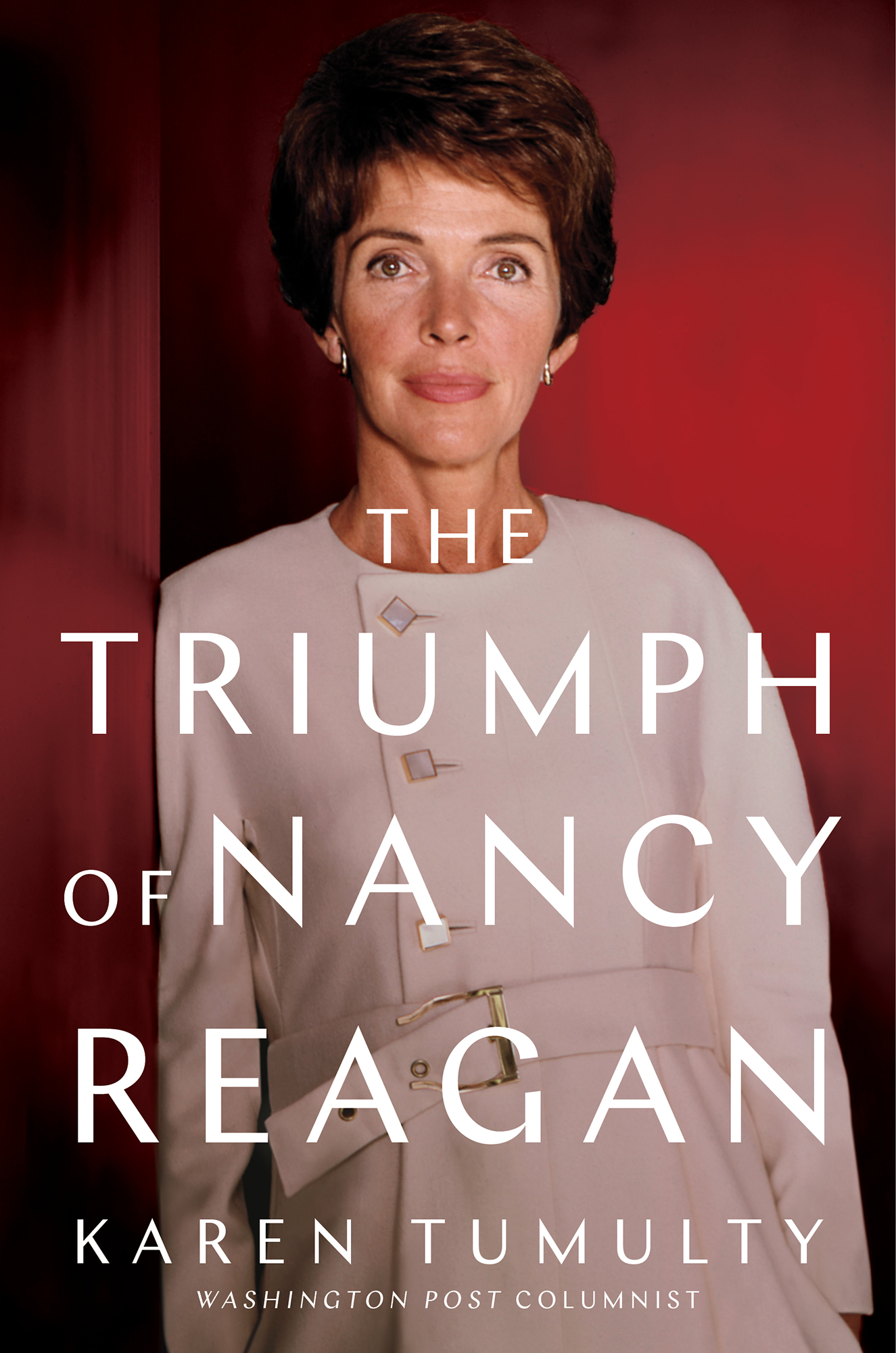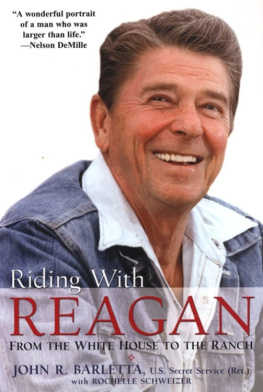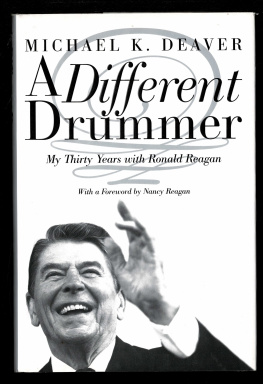Karen Tumulty - The Triumph of Nancy Reagan
Here you can read online Karen Tumulty - The Triumph of Nancy Reagan full text of the book (entire story) in english for free. Download pdf and epub, get meaning, cover and reviews about this ebook. year: 2021, publisher: Simon & Schuster, genre: Non-fiction. Description of the work, (preface) as well as reviews are available. Best literature library LitArk.com created for fans of good reading and offers a wide selection of genres:
Romance novel
Science fiction
Adventure
Detective
Science
History
Home and family
Prose
Art
Politics
Computer
Non-fiction
Religion
Business
Children
Humor
Choose a favorite category and find really read worthwhile books. Enjoy immersion in the world of imagination, feel the emotions of the characters or learn something new for yourself, make an fascinating discovery.

- Book:The Triumph of Nancy Reagan
- Author:
- Publisher:Simon & Schuster
- Genre:
- Year:2021
- Rating:4 / 5
- Favourites:Add to favourites
- Your mark:
- 80
- 1
- 2
- 3
- 4
- 5
The Triumph of Nancy Reagan: summary, description and annotation
We offer to read an annotation, description, summary or preface (depends on what the author of the book "The Triumph of Nancy Reagan" wrote himself). If you haven't found the necessary information about the book — write in the comments, we will try to find it.
The Triumph of Nancy Reagan — read online for free the complete book (whole text) full work
Below is the text of the book, divided by pages. System saving the place of the last page read, allows you to conveniently read the book "The Triumph of Nancy Reagan" online for free, without having to search again every time where you left off. Put a bookmark, and you can go to the page where you finished reading at any time.
Font size:
Interval:
Bookmark:

The Triumph of Nancy Reagan
Karen Tumulty
Washington Post Columnist

To my husband, Paul, and our sons, Nick and Jack

Reagan knew where he wanted to go, but she had a better sense of what he needed to do to get there.
L OU C ANNON ,
President Reagan: The Role of a Lifetime
T he second weekend of February 1983 found much of the Eastern Seaboard trapped by one of the biggest snowfalls of the century. Dubbed the Megalopolitan Blizzard, it caught forecasters off guard. The nations capital, notoriously ill-equipped for extreme weather, was paralyzed under a frozen blanket seventeen inches deep. In suburban areas, the snow was twice as heavy, hitting new records. All of this meant the president and first lady had to cancel their plans to go to Camp David on Friday afternoon as they customarily did. But even though they were stuck in the White House for the duration, there were delights to be had as the most self-important city in the world bent to the will of Mother Nature. When the blinding storm yielded to brilliant sunshine, Washington took on the feel of an Alpine village. Beyond the edge of the South Lawn, hundreds of people in parkas and wool caps were getting around on cross-country skis.
George P. Shultz, only seven months into his tenure as secretary of state, had just returned the previous Thursday from a long trip to Asia, which included a stop in China. Coming back, he had barely beaten the storm. The first flakes were falling as his government plane touched down at Andrews Air Force Base. On Saturday afternoon, as Washington began digging out, Shultz got a call from Nancy Reagan. Why dont you and your wife come over and have supper with us? she asked. There would be just the four of them, upstairs in the White House family quarters.
So, we go over, and were having a nice time, and then all of a sudden the president and Nancyboth of themare asking me about the Chinese leaders: What are they like as people? Do they have a sense of humor? Can you find their bottom line? Do they really have a bottom line? Shultz recalled. From there, the conversation moved on to the Soviet Union, and the president began to talk about his own ideas for engaging Americas superpower enemy. Shultz was struck by how much Ronald Reagan had thought about this; how self-confident he sounded about his abilities as a negotiator. And then suddenly the new secretary of state realized that the purpose of the evening was not entirely social. Nancy had planned it so that Shultz would begin to understand something important about her husbandsomething that had the potential to change history.
Im sitting there, and its dawning on me: this man has never had a real conversation with a big-time Communist leader and is dying to have one. Nancy was dying for him to have one, Shultz told me, still marveling at the moment more than thirty years later. Until that dinner, he had not really been sure that such a dialogue was possible. This, after all, was a president who had branded the Soviet Union as ruthless and immoral, and who was presiding over the biggest peacetime military buildup in US history. The Reagan administration, except for a few figures like Shultz, was populated by hard-liners who believed there could never be any such thing as a working relationship with Moscow. Did Ronald Reagan really see himself as the unlikely peacemaker who could lift the shadow of potential nuclear annihilation under which the entire planet had lived for nearly four decades? As Nancy Reagan would later put it: For years, it had troubled me that my husband was always being portrayed by his opponents as a warmonger, simply because he believed, quite properly, in strengthening our defenses. The world had become too small for the two superpowers not to be on speaking terms, and unless that old perception about Ronnie could be revised, nothing positive was likely to happen.
Shultz began to understand something else that night: he had found an invaluable ally in a first lady who understood her husband as no one else didwho was, in fact, the only person in the world to whom the president was truly close. In the years that followed, he would grow to appreciate more the unseen role that she played in protecting and shaping the Reagan presidency. Nancy rarely set foot in the West Wing, but her presence was felt by everyone who worked there. When she was displeased about something, they all knew it, and those who were not in her good graces tended not to last for long.
She watched the people around, both in the White House and around in the Cabinet. She had a pretty good idea who was really serving himself or herself and who was working for the president, Shultz said. I always thought anybody with any brains would make a friend of the first lady.
Ronald Reagan was endowed with enormous gifts: vision, ambition, optimism, and an ability to make the country believe in itself. He also enjoyed the benefit of being perpetually underestimated. But it was Nancy, wary by nature, who was the shrewder judge of people. Their son, Ron Reagan, described his mother as the skepticand the enforcerthat his ingenuous father needed to succeed in a business as cynical and opportunistic as politics. My father was as good a man as youll find in politics, or life for that matter. Very easygoing, very easy with people, very trusting of people. He was almost entirely guileless. There was no cynicism in him whatsoever. He tended to assume that other peoplecertainly people who were working for him and professed similar sensibilitieswere like that too, Ron said. My mother, on the other hand, understood that people had hidden agendas and that not everybody who talked a good game would back that up. She was unforgiving when she thought somebody had betrayed my father. When somebody needed to go, she was the one to know it first and, often as not, to make that happen.
Stu Spencer, who served as Ronnies chief political strategist from the dawn of his career in California, described the Reagans as an inseparable team politically and personally. He would never have been governor without her. He would never have been president without her. Nor without her might he have survived in the Oval Office, much less departed with a renown that would continue to shape politics for more than a generation after he left. That she would be capable of filling this role was far from obvious in her early naive days as California first lady, but over the years, Nancy grew to understand her power and to use it with great effect. When Ronnies presidency was on the brink of collapsing under scandal during his second term, it was Nancy who remained clear-eyed enough to put together the rescue effort. She was relentless and ruthless in engineering the firing of Donald T. Regan, his autocratic White House chief of staff. Her particular quality was she was street smart, Reagan biographer Edmund Morris said. She was aggressive and a street fighter, which Reagan was not. She handled all the nasty business.
Nancy exercised an influence unlike any first lady before or since. She was not the conscience of her husbands presidency, as Eleanor Roosevelt had been to FDR. She claimed no policy portfolio, as Hillary Clinton diddisastrously, on health careduring Bill Clintons first term in the Oval Office. Nor was Nancy secretly running the government in her husbands stead, though some critics compared her with Edith Wilson, who essentially assumed President Woodrow Wilsons duties for the last year and a half of his second term after he suffered a near-fatal stroke in 1919.
Font size:
Interval:
Bookmark:
Similar books «The Triumph of Nancy Reagan»
Look at similar books to The Triumph of Nancy Reagan. We have selected literature similar in name and meaning in the hope of providing readers with more options to find new, interesting, not yet read works.
Discussion, reviews of the book The Triumph of Nancy Reagan and just readers' own opinions. Leave your comments, write what you think about the work, its meaning or the main characters. Specify what exactly you liked and what you didn't like, and why you think so.


